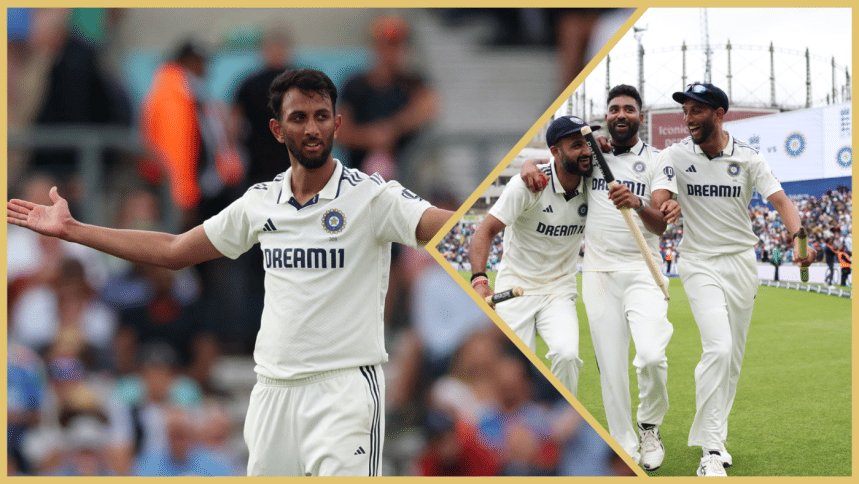Charioteer at The Oval: Krishna delivers under fire

In every great war, the final blow is rarely dealt by the generals. The ones history often conveniently chooses to forget are the footsoldier in the mud, the archer behind the ridge, the spy who doesn't blink.
The battle, however, remembers.
The glorious game of cricket, when played over five bruising Tests, echoes the same pattern: if the war is long, glory often finds the unlikely.
Case in point: the inaugural Anderson-Tendulkar Trophy had begun with panic stations around India's pace stocks but ended with two unsung names dragging the visitors to prosperous shores.
Before the 25 days of exhilarating action, when India coach Gautam Gambhir confirmed that their talisman Jasprit Bumrah would be playing only three of the five Tests, the alarm bells were immediate.
How on earth would they cope on pace-friendly English conditions without one of the finest pacemen of all time?
Mohammed Shami was nowhere in the picture, having been deemed unfit, Mohammed Siraj looked patchy, and to pad up the bench, they summoned Harshit Rana and Anshul Kamboj -- names still fresh from domestic scorecards.
Even Shardul Thakur, out of favour for over a year, found himself back in the mix. That's how bleak things looked for one of the elites of the game.
By the time the curtain dropped at The Oval on Monday, India had squared the five-match series 2-2. And the two Tests they won? Bumrah watched from the dressing room.
What happened had primarily boiled down to Siraj rediscovering his sting, charging in like a warrior who had remembered his oath. And flanking him, less heralded but no less committed, Prasidh Krishna found his voice.
Krishna's story in this series, however, began as the answer to a cruel pub quiz: the first Indian Test bowler to go for over a run-a-ball in both innings of a match, as he did at Leeds in the series opener.
In a region of the world where people forget fast and forgive slow, Krishna was discarded almost overnight after his forgettable returns at Leeds (1-220) and the subsequent Edgbaston Test (1-39) where India bounced back to level the series.
But cricket, especially the longest format, always keeps a back door open for the stubborn-hearted.
He was dropped for the third Test at Lord's, and then Manchester. Yet in the final chapter at south London, with the air thick and every run a brick in the wall, Krishna returned like a fisherman who had just focused on repairing his net while it was unsafe to sail.
Eight wickets -- four in each innings -- and when he dispatched No. 9 batter Josh Tongue with England needing 17 on the fifth morning, the home team's bravado had irreversibly wobbled.
If Siraj was the warrior who swung the sword at the decisive moments, ending with nine wickets and a player-of-the-match award, Krishna was the charioteer who steadied the charge.
"Prasidh complemented Siraj brilliantly in this Test. Siraj alone couldn't have won this match," P. Srinivasa Murthy, who coached the pacer at Bengaluru's Carmel High School. Told Mid-day.
"Just like batting partnerships, bowling partnerships are crucial too, and both Siraj and Prasidh shouldered that responsibility perfectly," reiterated the 52-year-old coach.
It helped, of course, that Krishna has fought on big occasions before. His Indian Premier League exploits, including a Purple Cap in the 2025 season, must have initiated him in the art of bowling through noise, expectation, and flashing cameras.
But this was different.
Murthy sees this as Krishna's beginning. He nudges him to chase Bumrah's standard -- someone who thrives across formats.
"Bumrah is wanted in every format. That should be his benchmark, aim," he said.
From setting an unwanted record to being "wanted" in one of the all-time classic Tests, Krishna answered, chin up and standing tall. Not bad for a six-feet-two quick they once deemed as all height, no bite.

 For all latest news, follow The Daily Star's Google News channel.
For all latest news, follow The Daily Star's Google News channel. 









Comments